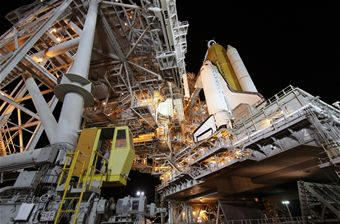
NEWSROOM
 |
NEWSROOM |
|
|
By Daniel Guevarra |
|
|||
 |
October 31, 2009, -- The Boeing Company announced it would be reducing Its work force reductions on the Checkout, Assembly and Payload Processing Services (CAPPS) program. "In response to the planned space shuttle program retirement and the final International Space Station elements being launched, The Boeing Company has announced to employees working on the Checkout, Assembly and Payload Processing Services program that work force reductions will take place in 2010.
It is important to The Boeing Company to keep its employees informed of
business decisions."Based on what we know today, Boeing is planning to
issue layoff notices to approximately 330 workers next year. The first
of these 60-day notices will be issued on Jan. 15, followed by one in
May and the final one in August. |
|||
|
The Government Accountability Office (GAO)
has indicated that a decision that must be made soon whether
to retire the Space Shuttle in 2010, as currently
planned, or to extend its life in view of limited options for supporting
the International Space Station. Already, shuttle contracts are being
phased out and shuttle facilities are being closed or transferred to
contracts supporting new development efforts. A decision in favor of extending the shuttle may offer the best course for the future of the International Space Station, as (1) the recent conflict between Russia and the Republic of Georgia has called into question the wisdom of relying on Russian space vehicles to ferry U.S. crew and cargo to and from the station during a 5-year gap in U.S. human spaceflight capability, and (2) it still appears that other vehicles being developed to support the station—including those from commercial suppliers as well as NASA—may not be ready when anticipated. However, extending the shuttle could also have significant consequences on the future direction of human spaceflight for the United States. Specifically, NASA is counting on the retirement of the shuttle to free up resources to pursue a new generation of space flight vehicles that is anticipated to come online in 2015. According to NASA, reversing current plans and keeping the shuttle flying past 2010 would cost $2.5 billion to $4 billion per year. In addition, extending the shuttle will likely be costly and logistically difficult, particularly since it would require restarting production lines and possibly recertifying suppliers as well as the shuttles. On the other hand, the new administration may well decide to extend the shuttle and defer development of new transportation vehicles in light of budgetary constraints, as the new vehicles are expected to cost more than $230 billion to develop and deploy. |
||||
| ©AvStop Online Magazine Contact Us Return To News |